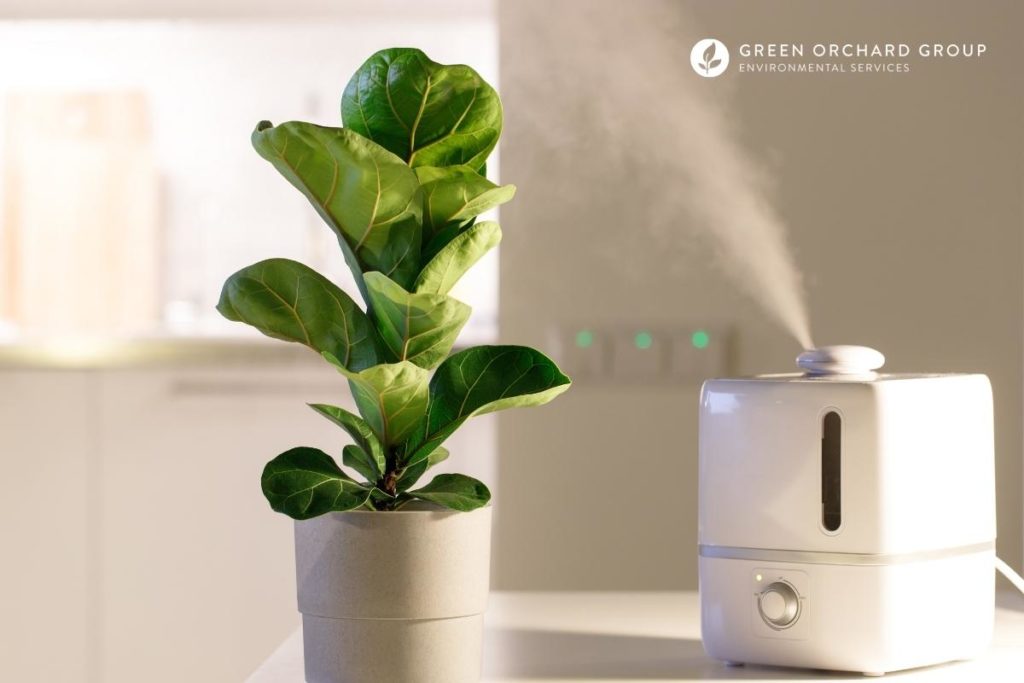Do you have concerns about mold or indoor air quality in your home or workplace?
Studies have shown that certain essential oils have antifungal properties that may be useful at home for purifying air and killing mold.
Although more research is needed in this area, evidence suggests that compounds contained in these essential oils can kill or inhibit the growth of mold.
In this article, we’ll introduce 5 air purifying essential oils that are effective against household mold.
Can Essential Oils Purify Air and Kill Mold?
Dust, allergens, mold spores, and volatile organic compounds (VOCs) produced by mold can all lead to a variety of potential health problems, especially since people are spending more time at home than ever.
There are over 100 types of essential oils, which are aromatic compounds extracted from plants. The active chemical components of these essential oils include phenols, terpenes, aldehydes, and ketones, some of which are believed to disrupt the fungal cell membranes of mold and destroy mold spores.
As a result, some of these essential oils may have air purifying and mold killing benefits. However, exactly how effective they are and which species of mold they’re effective against have are not yet fully understood.
Based on studies published in the International Journal of Occupational and Environmental Health and Reviews on Environmental Health, here are 5 essential oils that kill mold:
Although these essential oils have demonstrated a significant effect on killing or inhibiting mold growth, they should not be used as a replacement for proper mold control and cleanup.
The key to preventing mold in your home is moisture control — repairing and removing conditions that lead to excess moisture. If mold growth is found, it should be promptly cleaned and removed. For severe mold growth that covers more than 10 square feet, contact licensed mold professionals for assessment and remediation.
Homeowners can consider using essential oils in the form of vapor diffusers or liquid cleaning sprays in conjunction with other mold cleanup methods to freshen and purify air and stop mold from spreading.
5 Essential Oils That Kill Mold

1. Clove Oil
Clove is the essential oil that has been researched the most extensively for its antifungal properties. Evidence suggests that clove oil can kill mold and fungal spores almost as effectively as commercial disinfectants.
Clove has the greatest broad-spectrum antifungal effects among all essential oils studied so far. It’s effective against a wide range of mold species including Coprinellus, Ulocladium, Aspergillus, Penicillium, Trichothecium, and more. The main component of clove oil, eugenol, damages the fungal cell membrane and inhibits germ tube formation.
Approximately 1/2 to 1/4 teaspoon of clove oil diluted in 1 L of water can be used to kill mold on most hard, nonporous surfaces. Spray the solution on the mold and leave it overnight, then scrub it down using a stiff brush with soap and water the next day.
2. Tea Tree Oil
Tea tree oil, like clove oil, is known for being a natural antimicrobial cleaning agent that’s comparable to commercially available disinfectants.
Laboratory studies using tea tree oil have shown that evaporating tea tree oil in a room can temporarily decrease the concentration of airborne mold. The main active compounds in tea tree oil are alpha terpineol and terpene-4-ol, which kill mold spores by destroying the cell wall and causing cells to rupture and leak.
As an alternative to evaporating tea tree oil, you can try diluting 1 teaspoon of oil in 2 cups of water and applying it directly on the moldy surfaces with a spray bottle.
3. Eucalyptus Oil
Eucalyptus oil is a natural cleaner known for its powerful antimicrobial effects against many bacteria, and it is also thought to have air purifying benefits by killing airborne mold.
A study in 2017 found that eucalyptus oil had moderate antifungal benefits against two species of mold: Ulocladium and Coprinellus. While it doesn’t directly kill mold, eucalyptus oil inhibits mold from growing and producing new spores.
However, eucalyptus oil had little to no effect on the growth of the other two species of mold tested in the study, Penicillium and Aspergillus.
4. Lavender Oil
In the same study above, lavender oil was found to have similar effects as eucalyptus oil.
Lavender oil demonstrated inhibitory effects on mold growth and sporulation, although to a lesser degree. And like with eucalyptus oil, it was only effective against Ulocladium and Coprinellus — not Penicillium or Aspergillus.
The main active components in lavender oil are linalool and linalyl acetate, which also have antibacterial and antiviral properties that may be useful for purifying air.
5. Citrus Oil
Citrus essential oils are widely used in the food, cleaning, and pharmaceutical industries. Many all-purpose household cleaners use citrus oil as an ingredient, both for its antimicrobial effects and its fresh-smelling scent. When used in air purifiers, citrus oil helps freshen air and remove odors.
Like the other essential oils on this list, citrus oil has been shown to have potential antifungal effects. The volatile components of citrus essential oils — limonene and linalool — have been shown to inhibit the growth of Aspergillus and other species of household mold by disrupting the fungal cell membrane.
Other Essential Oils for Mold
Aside from the 5 essential oils above, research has shown that these other essential oils also may have mild to moderate effects for killing mold:
- Oregano
- Thyme
- Heartwood
- Cinnamon
- Bay leaf
- Peppermint
- Pine
- Cedar
Need Professional Mold Help?
Green Orchard Group’s licensed mold professionals are here to help. We are a leading environmental health and safety firm based in New York City, with over 25 years of experience in mold assessment and remediation services. If you’ve experienced or suspect mold in your home after a recent leak or flood, contact us today!

